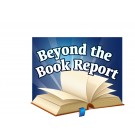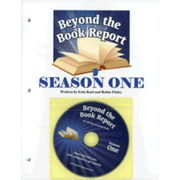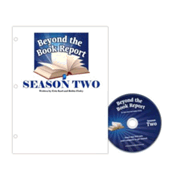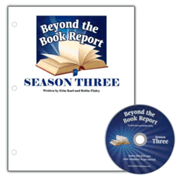Beyond the Book Report (BBR) is a middle school through high school language arts curriculum that pairs well with Analytical Grammar (AG) for a complete program that covers grammar, composition, and literature. BBR supplies coverage for the latter two areas, by cleverly designing writing activities around real books. BBR can also be used as a stand-alone resource. While BBR’s authors strongly recommend that students read classic literature for their real book selections, this is not an absolute requirement.
There are three “Seasons” or courses in the program. While the first two Seasons are ideal for middle school, the entire program can also be used with high school students. Season Three is for students in eighth grade through high school. The publisher’s website has suggested teaching schedules that show how you might schedule the three Seasons of BBR with AG depending upon the grade level at which you begin the program. They also include a scheduled time for vocabulary (WordBuild is recommended) so that the schedules cover everything you need for a complete language arts program that will take about one hour a day in middle school. You will likely complete one Season per year, but those just beginning with eighth graders might complete the first two Seasons in one year.
Each Season includes a DVD and a small packet of teacher pages that are pre-punched for insertion into your own binder. DVDs are to be run on your computer. The DVD for each course includes a series of lectures plus printable PDF files to be used with each lesson. An autorun feature on each DVD brings up an HTML index page that will come up in your browser; this page has a table of contents for the DVD with clickable links to open for both lectures and printable materials in the order in which they are to be used. This page makes it easy to figure out what to do next.
Students need to have each file with lecture slides printed out for use before watching each video presentation. Students write notes in the space provided on these pages as they watch each lecture.
Video lectures are presented by authors Erin Karl and Robin Finley with the aid of PowerPoint slides (the same slides reprinted on the student lecture slides pages). Lectures vary in length from a few minutes up to about 20 minutes. There are relatively few lectures, and these should be used at the appropriate points as laid out in the lesson plans in the teacher’s material. With instruction via the DVD and all of the printed materials (which you print in advance from the DVD), students should be able to work on their own a good part of the time. While videos provide the primary teaching for the courses, some discussion is needed. Parents or teachers need to discuss possible books students might select, and they will probably need to work with most students to ensure they are understanding concepts as they work through the lessons. Samples of all of the assignments are included in the teacher packet, and these should be shared with students. This course design makes this a good option for group classes that meet once or twice a week.
Season One is divided into three units: basic book report, pamphlet book report, and journalism book report. Students choose whatever books they wish to use as the subject matter for the first two units and for a journalism book report in the third unit. The Journalism adds a creative twist by having students select a nursery rhyme to use as the source of material for a news article.
Within the first unit, students learn literary study terms such as conflict, protagonist, antagonist, rising action, climax, and point of view. These terms are then used through the rest of the Season. Rather than writing simple book reports, students learn to write summaries and paraphrases based on the book they have chosen to read. Pamphlet book reports are as much a literary study exercise as a composition project since pamphlets use a pre-designed template as a means of presenting key literary elements students have identified in the book they have read for that unit. Students next learn to write objectively with the journalism unit exercises.
In Season One, students also create their own study questions and crossword puzzles for each book they read. Both activities motivate them to read carefully and pay attention to vocabulary rather than skimming over unfamiliar words.
Season Two has two lengthier units—Poetry Book Report and Drama Book Report—rather than three units. The Poetry unit is a fully developed course on poetry that covers many poetic forms. Students will write four types of poetry—a sonnet, a limerick, Haiku, and a narrative poem, all based on a book they have read. The Poetry unit has a lengthy exam, and the drama unit has a shorter quiz. Answer keys are in the teacher’s packet.
The drama unit discusses various forms of drama, then narrows down to Shakespeare’s “A Midsummer Night’s Dream” for in-depth study. Students practice paraphrasing speeches from the play, and they rewrite one scene into regular prose. For the book report connection, they take a scene from the book they have read and rewrite it as a script, including the setting, transitions, blocking, and other such details.
Season Three incorporates two smaller courses that Analytical Grammar produced a few years ago, The Essay and The Research Paper, as well as a unit on the Oral Book Report. In Season Three, the essay and research paper courses will now have video instruction. The essay course teaches personal, literary, and “issues” essays. (An issue essay is the type used by the SAT.) Students will write essays on short stories and a final essay on a book of their choosing. The research paper component teaches all of the steps in writing research papers. Students write a research paper on a famous author and another on a book, defending the thesis of the book. As students work through the Oral Book Report unit, they learn the basics of giving oral presentation, practice critiquing presentations by Erin Karl, and present an oral book report using PowerPoint slides. Season Three will take the longest to complete as you would expect for a high school level course.
Detailed scoring rubrics are provided for each written piece in each Season. Students should use these rubrics as guides to remind them of the key points upon which they will be assessed. Parents or teachers use the same rubric to grade student work. Rubrics include guidelines for the study questions and crossword puzzles in Season One. Rubrics for Season One are on the DVD, while rubrics for Season Two are in the teacher packet.
Beyond the Book Report seems like a creative way to bring together the study of literature with composition while allowing students to select what they will read. The format of the materials makes BBR very inexpensive for courses that include some DVD lesson presentation, and BBR can be used for multiple students at no extra cost. Samples of the video and some of the printable pages are available free on the publisher’s website.













